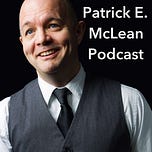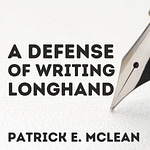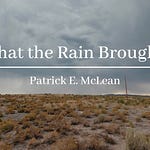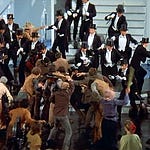
Video of the Original Talk:
There are 8 billion people in the world. And none of them have any spare attention. So if you want to get through to any of them, you have to be clear, you have to be fast and you have to be meaningful. Yet almost nobody thinks or writes this way.
Instead, “We are a society strangling in unnecessary words, circular constructions, pompous frills, and meaningless jargon.” In other words, bullshit. At the end of the day, when you open the Kimono, the net net of all of this is, with granular impacts and synergies is, well, not good.
As exhibit A, I will submit the entire internet. And the world of corporate and business communications. And this is not a problem that has a top-down solution. It has to come from the bottom up. From you and I.
As George Orwell observed — A man may take to drink because he feels himself to be a failure, and then fail all the more completely because he drinks. It is rather the same thing that is happening to the English language. It becomes ugly and inaccurate because our thoughts are foolish,
but the slovenliness of our language makes it easier for us to have foolish thoughts. Now every moment has problems. So I don’t want to be hysterical. But really, is there a better description of our current malaise than ‘foolish thoughts?’
So there’s a process I’d like you to buy into. We’re going to call it writing but the input is not keystrokes and the output is not a word or page count. The input is your audience’s attention and the output is the meaning (created in somebody’s head)
I’m going to say that again. The reason you write anything is to create meaning in someone’s head. First in yours— and then in someone else’s. And I believe much of what was inflicted upon you in school gets in the way or is counter productive to making meaning and sense of the world.
The more meaning you can pack into your reader’s attention, the more powerful your writing is. This is true of everything. It’s why great works of art, literature and music are great. You can come back to them again and again and get more meaning out of them.
Now attention can be difficult to measure, but word count isn’t. If you make something shorter, you’ve almost always make it better. But in school you were taught the opposite. Who here has suffered to write a 10 page essay?
This is a real example, “All meals should be rethermalized by the use of a microwave oven.” Now everybody in this room has a sense that there is something wrong with this, right?
You could try rewriting this a number of ways,
*All meals should be reheated before serving.*
*Microwave meals before serving.*
but they all converge on “Don’t serve cold meals.” And that clarity reveals what’s really going on. It allows you to deal with the real problem. And that’s why you murder your words. Because Clarity is Power.
But we’re awash in horsesshit. In a more honest age, the Department of Defense was the war department. A pre-emptive strike was just an attack. A police action was a war. And Human Resources, was basic decency.
The reason you don’t want to play games like this with your language —and I mean you personally, is that if you’re not clear with your words it’s hard for you to know what things mean. And then it become very hard for you to figure out what you should do. And then you wake up in the middle of the night feeling like life is too much and you have monster sitting on your chest.
Another way to chop a piece of writing down to size is to make sure you start with the MOST IMPORTANT THING. Most of the time, you can do this by taking the last paragraph of your first draft and making it the first first paragraph. Cause it takes a whole draft to figure it out.
In English, we expect the first thing we encounter to be the subject. And when it’s not, it takes a lot more attention to understand what’s going on. Sometimes people use this For example “An affair was had.” vs “I cheated on you.” The first one tries to hide the real subject. The subject isn’t even in that sentence because NOBODY wants to be the subject of that sentence.
Another example — You know those drapes you just put up in your living room? Yeah, well, they’re on fire and so’s the rest of your house. That sentence is grammatically correct. But if somebody said those things to you in that order, you’d know they had brain damage.
This is very important in business. Sure, the point of you email should be in the subject line, But also you or your company are *never*the most important thing to the customer. “I know you are in the market for a new car sir, but let me tell you about me.” But that’s exactly how 95% of proposal documents and pitch meetings start.
Here’s the reality. The world is made up of people. The majority of them are other people. You are the last thing on their mind. But if you want to get any of their attention and move them to action — you have be clear and you have to be quick.
Ultimately, there are only two ways to get someone to do something. You force them or you can persuade them. If you want to force people, I can’t help you, but good luck with the tear gas and the rubber bullets. But, if you want to persuade. Here’s my advice
*Start with most important thing.*
*Write about it as hard as you can.*
*Tell the truth without anger or fear.*
*If you find a word that’s not pulling it’s weight, delete it with extreme prejudice.*
How to Kill a Word Free Course: http://patrickemclean.com/how-to-kill-a-word-complete-course/













Share this post